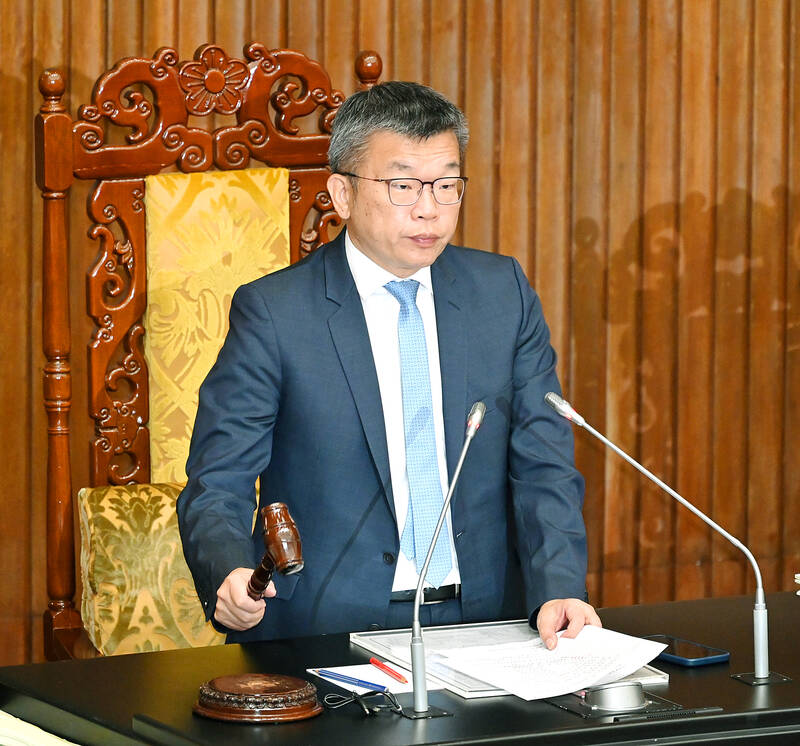Import tax for quartz glass products used in the semiconductor industry is to be lowered to 1.2 percent after the Legislative Yuan yesterday passed the third reading of an amendment to the Customs Import Tariff Act (海關進口稅則).
The Ministry of Finance last year proposed the amendment to ensure that the categories listed in the act align with last year’s edition of the Harmonized Commodity Description and Coding System published by the World Customs Organization. The bill was approved by Executive Yuan on Aug. 11 last year.
Quartz glass products used in the semiconductor industry are imported in many forms and can be classified under different tariff codes under current regulations, resulting in a range of applicable tax rates, the finance ministry said.

Photo: Liu Hsin-de, Taipei Times
For example, the import tax for glass balls, glass rods and glass tubes is set at 1.2 percent, while the tax for quartz crucibles used in the manufacture of semiconductors is 5 percent and that for other industrial glassware is 10 percent, the ministry said.
The amendment sets tax rules for quartz glass products exclusively used in the semiconductor industry and stipulates additional regulations, the ministry said.
If a quartz glass product is certified by the Ministry of Economic Affairs as for use in the semiconductor industry, it is to be taxed a uniform rate of 1.2 percent, meaning some products with import tax of 10 percent could benefit.
The amendment also adjusts the tax classification of squid products by adding four new categories: live, fresh or frozen squid; unsmoked frozen squid; dried, salted or soaked but unsmoked squid; and smoked squid.
The tax rates were set in accordance with the norms of the WTO, the ministry said.
The amendment would help expedite trade negotiations with other countries, the Executive Yuan said.
An amendment to the Social Worker Act (社會工作師法) was also passed by the legislature.
It bans those who have been found guilty of contravening the Sexual Assault Crime Prevention Act (性侵害犯罪防治法), Sexual Harassment Prevention Act (性騷擾防治法) or Child and Youth Sexual Exploitation Prevention Act (兒童及少年性剝削防制條例) from becoming social workers.

Trips for more than 100,000 international and domestic air travelers could be disrupted as China launches a military exercise around Taiwan today, Taiwan’s Civil Aviation Administration (CAA) said yesterday. The exercise could affect nearly 900 flights scheduled to enter the Taipei Flight Information Region (FIR) during the exercise window, it added. A notice issued by the Chinese Civil Aviation Administration showed there would be seven temporary zones around the Taiwan Strait which would be used for live-fire exercises, lasting from 8am to 6pm today. All aircraft are prohibited from entering during exercise, it says. Taipei FIR has 14 international air routes and

Taiwan lacks effective and cost-efficient armaments to intercept rockets, making the planned “T-Dome” interception system necessary, two experts said on Tuesday. The concerns were raised after China’s military fired two waves of rockets during live-fire drills around Taiwan on Tuesday, part of two-day exercises code-named “Justice Mission 2025.” The first wave involved 17 rockets launched at 9am from Pingtan in China’s Fujian Province, according to Lieutenant General Hsieh Jih-sheng (謝日升) of the Office of the Deputy Chief of the General Staff for Intelligence at the Ministry of National Defense. Those rockets landed 70 nautical miles (129.6km) northeast of Keelung without flying over Taiwan,

The Ministry of National Defense (MND) today released images of the military tracking China’s People's Liberation Army (PLA) movements during the latest round of Chinese drills around Taiwan. The PLA began "Justice Mission 2025" drills today, carrying out live-fire drills, simulated strikes on land and maritime targets, and exercises to blockade the nation's main ports. The exercises are to continue tomorrow, with the PLA announcing sea and air space restrictions for five zones around Taiwan for 10 hours starting from 8:30am. The ministry today released images showing a Chinese J-16 fighter jet tracked by a F-16V Block 20 jet and the

City buses in Taipei and New Taipei City, as well as the Taipei MRT, would on Saturday begin accepting QR code payments from five electronic payment providers, the Taipei Department of Transportation said yesterday. The new option would allow passengers to use the “transportation QR code” feature from EasyWallet, iPass Money, iCash Pay, Jkopay or PXPay Plus. Passengers should open their preferred electronic payment app, select the “transportation code” — not the regular payment code — unlock it, and scan the code at ticket readers or gates, General Planning Division Director-General Liu Kuo-chu (劉國著) said. People should move through the